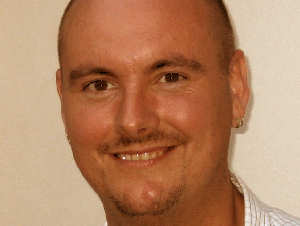What happens if we're offended on God's behalf
 Regular Network Norfolk columnist James Knight looks at what lies behind the hostile response towards controversial issues such as civil partnerships, women bishops and divorce.
Regular Network Norfolk columnist James Knight looks at what lies behind the hostile response towards controversial issues such as civil partnerships, women bishops and divorce.
I sometimes comment on the so-called controversial issues that are regularly and hotly debated in the church edifice. I find it quite peculiar that so many Christians are consumed by issues like homosexuality, women bishops, divorcees remarrying, and those kinds of issues with which so many church members are preoccupied. I don’t know why they get so uptight about these things, because virtually nobody that peddles this propaganda really believes it - it’s just the case that they have been swayed by the impetus of the cultural power that underwrites these issues. Christians think they are against them, because it’s so easy to create a mental label and then proceed to attack that label – but I think it’s simply the case that the belief that they are against them is more empowering than their actual level of objection. One is reminded of Coleridge’s criticism; “You do not believe; you only believe that you believe”.
I believe, based on what my recesses tell me, that I went to a Middle School disco in 1985. I haven’t given the matter much thought for years. If someone asked me how sure I was that the disco was in 1985, I’d say I think it was, but I might be a year or so out. If you proved to me that the disco was in 1984 I wouldn’t be very alarmed to find out I was one year out, because I don’t hold the belief rigidly.
That’s what I think the issues of homosexuality, women bishops, divorcees remarrying, etc are like for those who get upset about them – they believe their beliefs are honestly felt, but I think if you asked them to subject themselves to some brutal self-honesty you would find that those beliefs are more culturally driven – rather like an infection that gets passed on from Christian to Christian. Put it this way – if you’d have given these people a Bible and left them alone with it from childhood on a desert island with a lifetime supply of food and drink, I don’t think you would find when you returned in 30 years that they had adopted all these prejudices.
I think the reasons are fairly straightforward – why on earth should you be bothered about whether a homosexual couple decides to express their love for one another with a civil partnership? Why should you care if a once divorced woman finds love again and wants to express that love by getting remarried in a CofE church? Why get so uptight about the many talented women who show their talents in church leadership? Why should Catholics care if a couple wants to use contraception, or if a non-Catholic wishes to take communion in a Catholic Church when visiting the church? These people aren’t doing any harm to you.
In most cases those issues are none of your business and they are none of mine either. People express their discontent not out of genuine concern but because that’s how they think they are supposed to feel. It’s as though they think they are doing a service to God by becoming offended on His behalf. I think we all know why that is – it’s the same reason fundamentalists quote their own interpretation of scripture as though they alone speak for God. It’s a form of self-righteousness that they believe to be piety.
I do have some background knowledge of how this manifests itself. Until recently I hadn’t perhaps introspected about my background as much as I should have. My initial foray into Christian life was set against a backdrop of fundamentalist influence. I don’t mean the anti-science nonsense that bedevils parts of the Christian culture, nor the issues I mentioned earlier. But in the inceptive days of my conversion I did mix in circles that drew upon a typically black vs white interpretation of the gospel, and for a while (and to my regret) I did adopt an all or nothing mentality that to the more balanced and liberal thinker probably would have made me seem like a fundamentalist too. But I did find my way out – and if one finds oneself uncomfortable in a certain skin, then as long as wisdom is continually sought one does find a way out of it.
I think I have been alerted to the dangers of the kind of Christianity I just described precisely because for a time I was becoming ensnared in it myself. I saw the reactions of others to the kind of God I was trying to present as a convincing model of the truth. What I was presenting wasn’t the kind of God I went on to believe in – I was presenting a God who stands behind the backdrop of a black vs white battle, and I wanted to ensure that those I was communicating with chose the right side. What caused me to move away from that kind of methodology was that I began to realise that I wasn’t matching my personality to that of God, I was constructing a mental image of God based on my own personality at the time – which was very much centred on a radical view of truth where right and wrong theories and beliefs were easily demarked into ‘true’ or ‘false’ classifications.
If something was going to have to change it was going to have to be me. I needed to go through a flushing out process in which I could rid myself of the psychological contaminates that had been, in part, stirred into my system by other right wing Christians who had such a positive influence on me in the beginning (or so I thought), and, in part, stirred into my system from past experiences extending all the way back into my childhood. Once I set myself on the path of an honest pursuance of Godly wisdom I began to see the liberty I had been taking in expecting that I knew God’s will in every situation. My life had echoes of the scene in Hamlet in which the 'Mousetrap' play is put on in order to elicit fratricidal guilt in King Claudius (what Shakespeare called "catching the conscience of the king"). I felt like I was able to step out of the play around me and view my life from the outside, learning quite a few things about myself from this meta-perspective. So I do know how much one’s psychological character drives the belief system others see – there is no shame in admitting it; the only mistake, I think, is in pretending it isn’t there and carrying on trying to manipulate other people’s life directions because you are so certain that you know the truth.
 I have been doing some work with a terrific organisation that helps recovering ex-fundamentalists (or victims of other people’s fundamentalism) come to terms with what they had been brought up in (particularly in the United States), and provides a relaxed and caring intellectual climate in which they can speak openly about the brainwashing they’ve endured, and also learn about the many wonderful truths in nature that were previously blocked by the manifolds of fundamentalism.
I have been doing some work with a terrific organisation that helps recovering ex-fundamentalists (or victims of other people’s fundamentalism) come to terms with what they had been brought up in (particularly in the United States), and provides a relaxed and caring intellectual climate in which they can speak openly about the brainwashing they’ve endured, and also learn about the many wonderful truths in nature that were previously blocked by the manifolds of fundamentalism.
Regarding the issues I raised at the start of the article. Here’s why I feel so sure that their upset is misjudged. What does anybody actually gain from condemning a woman bishop or a homosexual couple? Nothing, as far as I can tell. What they lose though is a lot, because humans really ought to minimise suffering as much as possible – and believe me, people who are ostracised or marginlised do suffer the effects of this stigmatisation. They are made to feel like they always have to be on the defensive – and many times they come away from church life quite hurt and despondent. Here’s the other thing; no one is saying you have to accept homosexuals or divorcees or women bishops – if acceptance really isn’t in your constitution then you are free to think as you see fit. But I think you would be more blessed and emotionally renewed if you could find it in your heart to accept those you denounce. Your hostility isn’t going to make a gay man straight, nor will it turn a female vicar away from the church. But your refusal to publicly condemn and your willingness to keep it as a private frustration will be a good thing – because it admits the humility of saying ‘I might be wrong about this issue, so I’ll err on the side of caution’. By all means let us speak out against things we feel called to challenge; but let’s use some sense of prudence is working out what the real core problems are. Then it might become clear that people’s gender or past mistakes or sexual orientation are none of our business.
In order to give yourself the best chance of making a sound judgement, try this little exercise. Whenever you are arguing for or against what you feel to be one of the big issues, pretend you have to put yourself in the shoes of the person with whom you disagree. Next, use all the knowledge and brainpower you have to argue his (or her) position for him on his behalf. One cannot easily fail to appreciate the other person’s position once one has made an honest and persuasive effort to defend it. There is something quite noble in trying to defend the position opposite to one’s own; it will certainly help the formation of a balanced view, and will either give you better reasons to justify your original belief or it will give you a perspective of the opposite belief that you didn’t previously have. Either way your position is strengthened, and your life journey will be more enriched.
The views carried here are those of the author, not of Network Norwich and Norfolk, and are intended to stimulate constructive debate between website users. We welcome your thoughts and comments, posted below, upon the ideas expressed here. You can also contact the author direct at james.knight@norfolk.gov.uk
James is a Christian writer and local government officer based in Norwich. You can access his current collections of columns here
Meanwhile, if you want to find out more about Christianity, visit: www.rejesus.co.uk